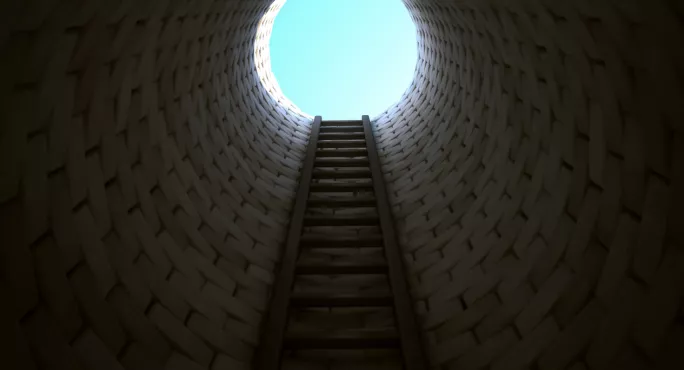- Home
- Are we at the beginning - maybe - of the end of Covid?
Are we at the beginning - maybe - of the end of Covid?

Before we get to the present and then the future, let’s take a glance at the past.
Benjamin Disraeli, a founder of the modern Conservative party, was British prime minister twice. Memorably, he said that the two saddest words in politics are “too late”.
Hold on to that thought.
Back to now. This week, the UK reached a grim milestone, with the news that we had become the first country in Europe to pass 50,000 coronavirus deaths.
Meanwhile, in the world of education, the impact on children since the first national lockdown in March was highlighted in a bleak Ofsted report, based on school visits in September and October. Some young children, it seems, have lapsed back into nappies, while others have forgotten how to eat with a knife and fork, or lost their early progress in words and numbers.
Coronavirus: Why schools are essential
Among older children, inspectors heard that some are showing signs of mental distress, manifesting in an increase in eating disorders and self-harm.
Across all age groups, children with special educational needs have been seriously affected.
If we ever needed an illustration of why it is essential to keep schools open during this second lockdown and beyond, this report provided a starkly compelling case.
So, in these desperate circumstances, it may seem odd to find crumbs of comfort. And yet, this was also the week that we may look back upon as something of a turning point.
Rays of hope
First, there was news of a breakthrough in the search for a vaccine.
Interim analysis has shown that a candidate vaccine from Pfizer and BioNTech was 90 per cent effective in protecting people from transmission of the virus in global trials.
John Bell, Regius professor of medicine at Oxford University, said it was “an amazing level of efficacy”, and could mean a return to normality by the spring.
Second, the Department for Education’s weekly statistics showed that school attendance was stable, at around 89 per cent, and that fewer schools have pupils self-isolating than in mid-October.
This suggests that parents have not been spooked by the announcement of a second lockdown into keeping children away from school. It may also be a sign that, while the amount of disruption affecting schools remains very significant, the situation may - just may - be improving.
These rays of hope require caution, of course.
The findings on the vaccine are an interim analysis. The trial will need to be completed, regulatory approval secured, and the vaccine distributed on an epic scale.
And the fact that fewer schools have pupils self-isolating comes after the half-term period, which may have acted as a welcome firebreak in transmission.
It is possible that disruption will increase as the term progresses, or the impact of the wider lockdown may reduce self-isolation cases further. The truth is that none of us really knows.
Some sort of beginning of some sort of end
These cautionary notes aside, however, this week has felt like we may, after eight dreadful months, be at some sort of beginning of some sort of end.
But that end, when it comes, won’t be a full stop. The repercussions of the pandemic will be with us for a long time to come, not least in education.
Many children will continue to need extra educational and pastoral support. And schools and colleges desperately need additional financial support from the government, to pay for the huge Covid-associated costs they are incurring.
The government’s continued refusal to reimburse these costs - or indeed to understand their scale and impact - is nothing short of shameful.
Most pressing of all is the matter of next summer’s GCSEs, A levels, and other qualifications.
Pupils will have had such varying learning experiences that exams cannot possibly go ahead as normal. This is generally recognised, but finding a solution is another matter entirely.
It’s time for action
The answer announced in Wales this week was to scrap end-of-year exams and have assessments that will be externally set and marked, but delivered in a classroom environment under teacher supervision.
Meanwhile, the government in Westminster continues to be paralysed by indecision. It is determined that exams should take place but has yet to announce how it will make them fair, or what might be the contingency arrangements if students are unable to take them.
Now, following the decision in Wales, it is under even more pressure to end this uncertainty. This is adding hugely to the anxiety of the students affected, and to the frustration of their teachers.
The end may, at last, be in sight in the immediate crisis, but the legacy will last much longer, and pupils taking crucial qualifications must not suffer any more harm.
Benjamin Disraeli didn’t only teach us that the saddest words in politics are “too late”. He also said: “Action may not always bring happiness, but there is no happiness without action.”
The Westminster government finds itself in this situation through its own fault, having dithered over the crucial matter of examinations for far too long. Before it’s too late, it’s time for action.
Geoff Barton is general secretary of the Association of School and College Leaders
Keep reading for just £1 per month
You've reached your limit of free articles this month. Subscribe for £1 per month for three months and get:
- Unlimited access to all Tes magazine content
- Exclusive subscriber-only stories
- Award-winning email newsletters



